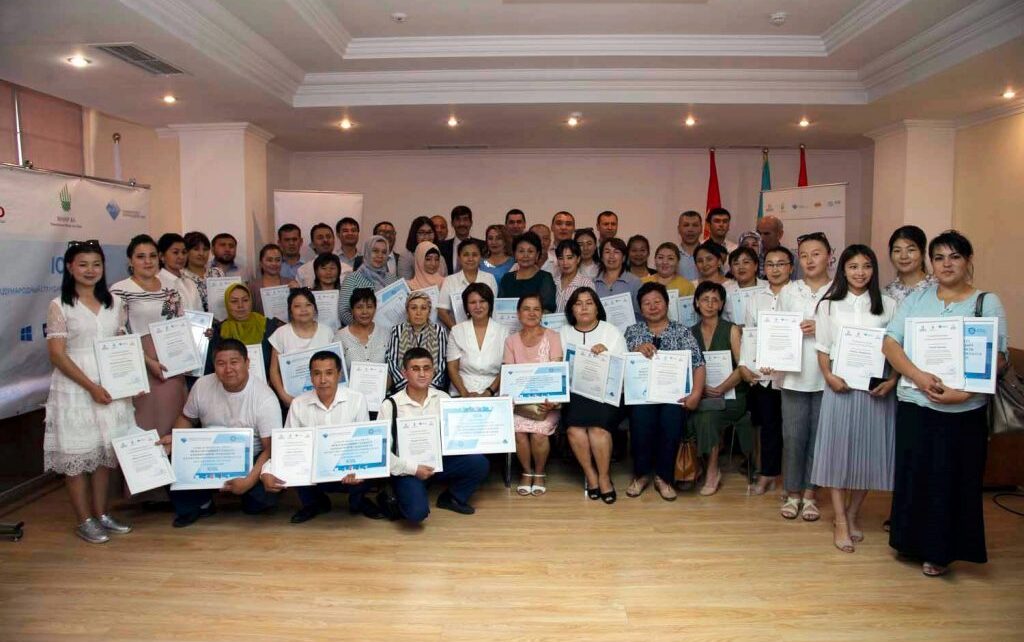Context: In 2020, youth (those aged 14–28, as defined in Kyrgyzstan) comprised almost a quarter of Kyrgyzstan’s total population. However, only half of these young people had completed their high school education; and one in eight youth who had actively sought a job could not find employment. In Kyrgyzstan, youth often live in environments where poverty and unemployment are widespread due to limited economic opportunities, poor access to public services and corruption. Opportunities for youth to voice their opinions in public or private spaces are scarce.
Implementation of programme/ initiative: In October 2017, the ‘Enhancing Employability and Civic Engagement of Youth (Demilgeluu Jashtar)’ project began, with a total budget of USD 3.3 million. The project timespan is five years and it has been implemented and funded by numerous developing partners including: the United States Agency for International Development; the Kyrgyzstan Mountain Societies Development Support Programme; the University of Central Asia; the Aga Khan Foundation in Kyrgyz Republic; the Association of Social Entrepreneurs; and the International Debate Education Association in Central Asia. The project aims to facilitate more active and positive youth participation in civic, social and economic domains, and contribute to community and family development, along with equipping participants with relevant skills for the labour market. In particular, the project: provides training for young people on leadership, life skills, entrepreneurship, and professional development skills; works with young people in target areas to encourage them to solve issues and develop initiatives that, in cooperation with local governments, support their communities; helps to develop policies from research based on issues affecting young people. The programme is being implemented in communities in Suzak District, Jalal-Abad Oblast, Kochkor District, Naryn Oblast and Naryn Town, Naryn Oblast.
Main challenges: Due to tension between ethnic groups and other sensitive issues, the marginalized and disengaged youth of Kyrgyzstan are prone to conflict and harmful behaviour. The COVID-19 pandemic has exacerbated the effects of these conflicts, having made it much more difficult for youth to secure employment, as much economic activity has come to a halt. Furthermore, young people in Kyrgyzstan often fail to be recognized as a valuable human resource for the country’s socioeconomic development; this project aims to challenge this view and mobilize the unique capacity of youth to contribute to development and social cohesion.
Results achieved: Although project implementation is ongoing, significant progress has been made thus far. In 2020, more than 300 young people in the target areas came together to form youth working groups. These working groups developed and implemented 24 different initiatives aimed at improving quality of life in Bazar-Korgon District of Jalal-Abad Oblast, Aravan District of Osh Oblast and Naryn District of Naryn Oblast communities. Some 312 young people completed a wide variety of professional courses, selected because of their current relevance to the demands of the labour market, namely: sewing, hospitality in restaurants, computer skills and other professional skills. Over 200 young entrepreneurs successfully completed social entrepreneurship programmes, of which 14 were supported with grants to start their own businesses. Across some 50 schools from target village districts, ICDL (a globally recognized information and communication technology and digital literacy qualification) test centres were established, enabling students to receive official ICDL certifications. In 2021, in response to the pandemic, youth working groups also helped disinfect hospital surfaces and provide hot meals to doctors.
Moving Forward: More participants of Demilgeluu Jashtar aim to complete their courses before the project closing date (September 2022). Those who have finished are looking towards receiving grants to support with starting their own businesses, of which women-led enterprises are prioritized; others are also working with local governments to develop policies that would better deliberate and resolve the problems of the youth in their own communities. The project further hopes to distribute more computers and other necessary information and technology equipment to a greater number of schools in rural areas across the country.
Replicability: Demilgeluu Jashtar’s model demonstrates the positive impact that youth-led initiatives can have. The project shows that forums enhancing the understanding of youth – such as with regard to the latest developments in business, marketing, politics, civic activism and other pressing topics – can inspire them to become young leaders and entrepreneurs themselves, or help their communities and connect with other young like-minded people. The project also demonstrates that, even with the persisting COVID-19 pandemic, programmes can continue to be executed, for instance through online means that support skills development and provide enhanced civic engagement among young people.
Acknowledgement:
This good practice was kindly prepared by Ms. Alysha Brahmantiara Putri.
References:
https://www.unicef.org/kyrgyzstan/adolescents-youth
Project Details
Date: November 5, 2021
